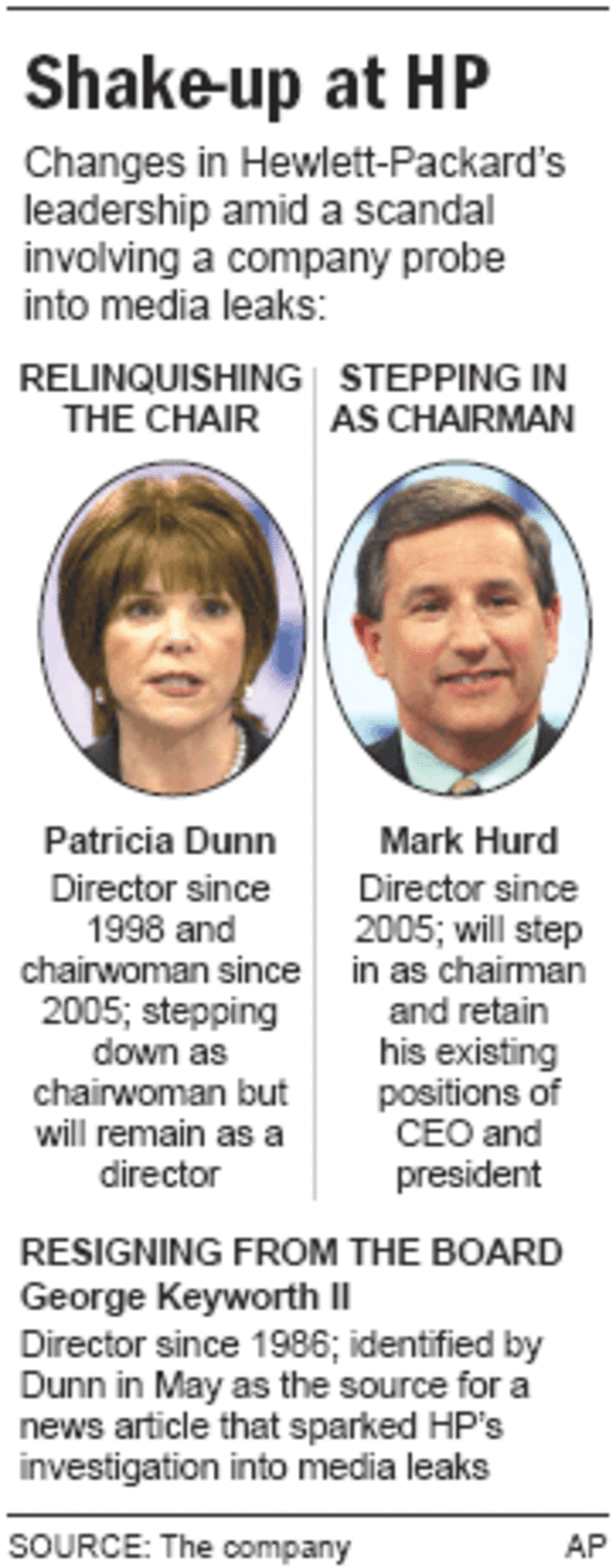Criminal charges could come within a week in the boardroom spying scandal at Hewlett-Packard Co., the state Attorney General’s Office said Wednesday.
Spokesman Tom Dresslar did not say who would be charged or what the charges would be. He also emphasized that it may take longer for the detailed investigation to produce charges.
“We’re not going to confine ourselves to any particular timetable,” Dresslar said. “We’ll go when we’re ready to go, and not a minute before that.”
On Tuesday, Attorney General Bill Lockyer said he already had enough evidence to charge HP insiders and the private investigators who impersonated board members and journalists in order to access logs of their personal phone calls.
“We currently have sufficient evidence to indict people both within Hewlett-Packard as well as contractors on the outside,” Lockyer told PBS’ “NewsHour with Jim Lehrer.”
He has said HP’s internal probe of media leaks violated two California laws governing identity theft and illegal access to computer records.
The FBI and the U.S. attorney for Northern California are also investigating HP for illegal computer intrusion and wiretapping. The company also faces inquiries by the Securities and Exchange Commission, the Federal Communications Commission and the U.S. House Energy and Commerce Committee.
On Tuesday, the company announced that Chairwoman Patricia Dunn would step down in January and be replaced by chief executive Mark Hurd.
Dunn has admitted authorizing the investigation into who was leaking boardroom secrets to reporters, but said she was appalled that private investigators hired by the company used Social Security numbers to impersonate HP directors and reporters, then persuaded phone companies to turn over detailed logs of their home phone calls.
The ruse — known as “pretexting” — is commonly used by private investigators but is against the law, according to Lockyer.

Dunn would appear to be the most likely HP insider to be charged in the criminal probe, but legal experts said investigators must prove that she knew the investigators would be engaging in illegal activity.
“If she had no idea that anyone was going to be involved in this type of conduct, then under our system of justice she shouldn’t be prosecuted,” said Ken Sukhia, a former U.S. attorney in Tallahassee, Fla.
It’s unclear who did know that personal phone records were being compromised by the investigators.
One of the firms HP hired to conduct the probe is Security Outsourcing Solutions Inc., according to The New York Times and The Wall Street Journal, citing people familiar with authorities’ probes.
That business’ address and phone number match those of a law firm with an office in downtown Boston, Bonner Kiernan Trebach & Crociata. One staff member who would not identify herself Wednesday told The Associated Press she had never heard of Security Outsourcing Solutions. Another woman referred inquiries to partner John Kiernan, who was not immediately available for comment.
Two other board members who became ensnared in the leaks investigation are unlikely to be charged.
At a board meeting in May, Dunn identified director George Keyworth III as the source of a January article on CNET Networks Inc.’s News.com. The board asked Keyworth, 66, to resign, but he refused. HP then barred him from seeking re-election.
Keyworth, HP’s longest serving board members, resigned Tuesday. He acknowledged speaking to reporters but said he did so with the company’s approval.
The attempt to oust Keyworth last spring riled another board member, longtime Silicon Valley venture capitalist Tom Perkins, 74, who stormed out of the May 18 meeting. His lawyer later pressed HP to reveal the reason for his resignation, which led to the SEC filing last week in which the company revealed its leaks investigation.
Two lawyers also were allegedly involved in the pretexting scandal.
Larry Sonsini, a noted Silicon Valley legal mind, served as an outside adviser to the HP board during the investigation. In an e-mail exchange with Perkins in June, obtained by The Wall Street Journal, Sonsini said he was not involved in “the design or conduct of the investigation,” but that it appeared to be legal.
Sonsini also warned Perkins not to talk to outsiders about confidential board processes and deliberations because that would be a breach of his responsibilities as an HP board member.
In his e-mail, Sonsini says Ann Baskins, HP’s general counsel, vetted the leak investigation and believed it to be legal.